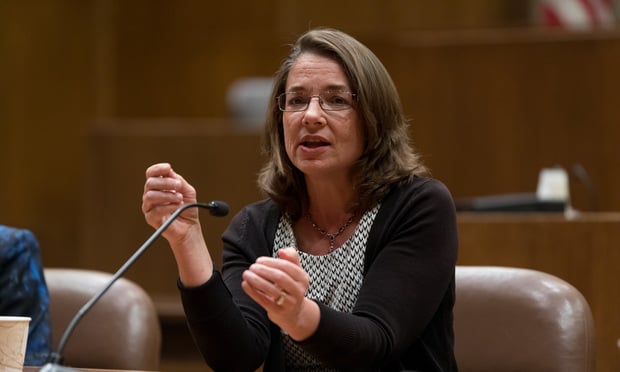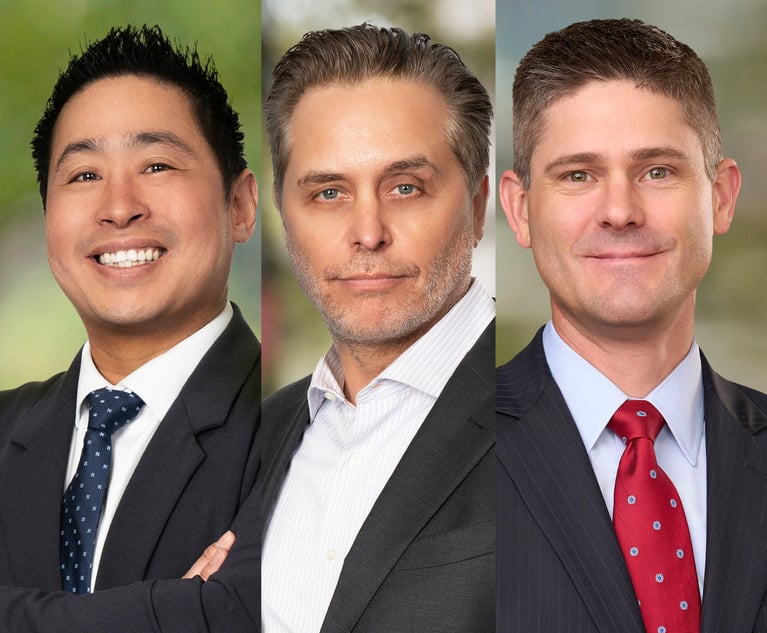Judge Seeks to Solve Discovery Spat in Facebook Privacy Suit ... With Zoom
U.S. Magistrate Judge Jacqueline Scott Corley advocated for informal, virtual face-to-face communication and understanding during these unprecedented times.
April 17, 2020 at 06:49 PM
3 minute read
 Magistrate Judge Jacqueline Scott Corley speaks at a candid Federal Bar Association event highlighting some judges and court procedures.
Magistrate Judge Jacqueline Scott Corley speaks at a candid Federal Bar Association event highlighting some judges and court procedures.
A federal magistrate judge ordered Facebook and plaintiffs in a proposed class action stemming from the company's Cambridge Analytica scandal to regularly hop on video conference calls to squash an ongoing discovery dispute.
U.S. District Magistrate Judge Jacqueline Scott Corley of the Northern District of California told Facebook's lawyers from Gibson, Dunn & Crutcher and plaintiffs counsel from Keller Rohrback and Bleichmar Fonti & Auld to meet and confer via video conferencing platform Zoom, not letters or email.
"Going forward I might order this in everything," said Corley during a hearing held via Zoom video conference Friday morning. Corley, who is overseeing discovery disputes in the multidistrict litigation pending before U.S. District Judge Vince Chhabria of the Northern District of California, noted that the method is working very well in the Juul multidistrict litigation, another case in which she is overseeing the discovery process.
In a status report filed Thursday, plaintiffs attorneys raised concerns about discovery of electronically stored information including disagreements over protocol, search terms and potential custodians. Gibson Dunn wrote in the filing that "Facebook has endured an escalating barrage of discovery letters," despite producing more than 250,000 pages of electronically stored information.
To expedite discovery, Chhabria earlier this year ordered Facebook to hand over documents related to inquiries from regulators such as the Federal Trade Commission that investigated claims the social network breached its privacy guidelines when Facebook apps gathered unauthorized data from users indirectly through friends.
The judge said the lawyers' status report was "a bit like two ships passing in the night," and she hopes the informal face-to-face communication will make it so "no one needs to feel like they're chasing the other down or getting bombarded."
Gibson Dunn's Orin Snyder suggested one of the meet and confers be "a cocktail zoom."
"That is an excellent suggestion. I would order that if I could," Corley said.
Cocktails or not, the judge did recommend keeping the Zoom meetings as friendly as possible.
"We're working hard, but we're distracted," she said. "Everyone doesn't know if their law firm is going to be here a year from now, or they have their kids running around behind them and they're trying to homeschool. There are things that are frankly bigger that are happening that we need to be conscious of," she said. "This is an unprecedented time, and we need to be understanding. Keep in mind that everyone is doing their best at this time."
Snyder said that it meant a lot for the judge to tell them they could "chill out a bit," and the judge affirmed that it was OK that Snyder and Gibson Dunn's Joshua Lipshutz were not wearing ties, an outfit choice the two lawyers had emailed about in advance, according to Snyder.
Keller Rohrback's Derek Loeser said, "I was kind of happy to put one on and make this seem like a normal week."
This content has been archived. It is available through our partners, LexisNexis® and Bloomberg Law.
To view this content, please continue to their sites.
Not a Lexis Subscriber?
Subscribe Now
Not a Bloomberg Law Subscriber?
Subscribe Now
NOT FOR REPRINT
© 2025 ALM Global, LLC, All Rights Reserved. Request academic re-use from www.copyright.com. All other uses, submit a request to [email protected]. For more information visit Asset & Logo Licensing.
You Might Like
View All
White & Case KOs Claims Against Voltage LLC in Solar Companies' Trade Dispute


'A Death Sentence for TikTok'?: Litigators and Experts Weigh Impact of Potential Ban on Creators and Data Privacy

‘Extremely Disturbing’: AI Firms Face Class Action by ‘Taskers’ Exposed to Traumatic Content
5 minute readLaw Firms Mentioned
Trending Stories
- 1SurePoint Acquires Legal Practice Management Company ZenCase
- 2Day Pitney Announces Partner Elevations
- 3The New Rules of AI: Part 2—Designing and Implementing Governance Programs
- 4Plaintiffs Attorneys Awarded $113K on $1 Judgment in Noise Ordinance Dispute
- 5As Litigation Finance Industry Matures, Links With Insurance Tighten
Who Got The Work
J. Brugh Lower of Gibbons has entered an appearance for industrial equipment supplier Devco Corporation in a pending trademark infringement lawsuit. The suit, accusing the defendant of selling knock-off Graco products, was filed Dec. 18 in New Jersey District Court by Rivkin Radler on behalf of Graco Inc. and Graco Minnesota. The case, assigned to U.S. District Judge Zahid N. Quraishi, is 3:24-cv-11294, Graco Inc. et al v. Devco Corporation.
Who Got The Work
Rebecca Maller-Stein and Kent A. Yalowitz of Arnold & Porter Kaye Scholer have entered their appearances for Hanaco Venture Capital and its executives, Lior Prosor and David Frankel, in a pending securities lawsuit. The action, filed on Dec. 24 in New York Southern District Court by Zell, Aron & Co. on behalf of Goldeneye Advisors, accuses the defendants of negligently and fraudulently managing the plaintiff's $1 million investment. The case, assigned to U.S. District Judge Vernon S. Broderick, is 1:24-cv-09918, Goldeneye Advisors, LLC v. Hanaco Venture Capital, Ltd. et al.
Who Got The Work
Attorneys from A&O Shearman has stepped in as defense counsel for Toronto-Dominion Bank and other defendants in a pending securities class action. The suit, filed Dec. 11 in New York Southern District Court by Bleichmar Fonti & Auld, accuses the defendants of concealing the bank's 'pervasive' deficiencies in regards to its compliance with the Bank Secrecy Act and the quality of its anti-money laundering controls. The case, assigned to U.S. District Judge Arun Subramanian, is 1:24-cv-09445, Gonzalez v. The Toronto-Dominion Bank et al.
Who Got The Work
Crown Castle International, a Pennsylvania company providing shared communications infrastructure, has turned to Luke D. Wolf of Gordon Rees Scully Mansukhani to fend off a pending breach-of-contract lawsuit. The court action, filed Nov. 25 in Michigan Eastern District Court by Hooper Hathaway PC on behalf of The Town Residences LLC, accuses Crown Castle of failing to transfer approximately $30,000 in utility payments from T-Mobile in breach of a roof-top lease and assignment agreement. The case, assigned to U.S. District Judge Susan K. Declercq, is 2:24-cv-13131, The Town Residences LLC v. T-Mobile US, Inc. et al.
Who Got The Work
Wilfred P. Coronato and Daniel M. Schwartz of McCarter & English have stepped in as defense counsel to Electrolux Home Products Inc. in a pending product liability lawsuit. The court action, filed Nov. 26 in New York Eastern District Court by Poulos Lopiccolo PC and Nagel Rice LLP on behalf of David Stern, alleges that the defendant's refrigerators’ drawers and shelving repeatedly break and fall apart within months after purchase. The case, assigned to U.S. District Judge Joan M. Azrack, is 2:24-cv-08204, Stern v. Electrolux Home Products, Inc.
Featured Firms
Law Offices of Gary Martin Hays & Associates, P.C.
(470) 294-1674
Law Offices of Mark E. Salomone
(857) 444-6468
Smith & Hassler
(713) 739-1250






